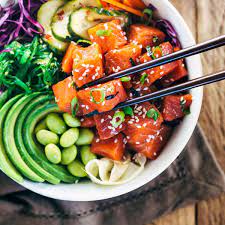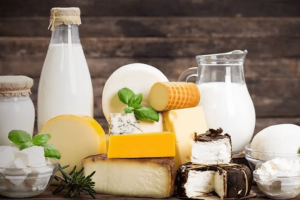1. Fruits and Vegetables Rich in Antioxidants
I want to take a moment to talk about the role of antioxidants, and particularly, phytonutrients: natural compounds found in plant foods that support the body’s natural oxidant defense system.
Oxidative stress is something that occurs in the body naturally as a process of everyday metabolism. Basically, it refers to the production of compounds called oxygen free radicals which have the potential to do damage to cells if their production isn’t squelched by antioxidants.
As long as the body has plenty of antioxidants available, the level of oxidative stress in the body can be kept in check. But if there are inadequate antioxidants available and oxidative stress increases, it can weaken the body’s ability to fight off illness.
Phytonutrients are found in brightly colored fruits and vegetables, so if it helps, think of “painting your plate” with a rainbow of colors as you shop for fruits and vegetables:
Red and Red-Purple– tomatoes, watermelon, pink grapefruit, guava, berries, plums, cherries, beets, red pepper, red cabbage Orange and yellow – carrots, sweet potatoes, yellow peppers, oranges, bananas, pineapple, tangerines, mango, pumpkin, apricots, winter squash (butternut, acorn), peaches, cantaloupe, corn Green and Yellow-Green – spinach, avocados, asparagus, artichokes, broccoli, kale, cabbage, Brussels sprouts, kiwi fruit, collard greens, green tea, green herbs (mint, rosemary, sage, thyme, and basil) White and brown: onions, cauliflower, garlic, leeks, parsnips, daikon radish, mushrooms In addition to phytonutrients, vitamins C and A also have antioxidant properties, which makes it more important to stock up on both fresh and frozen fruits and vegetables.
Vitamin C is a crucial player in various aspects of the immune system, particularly immune cell function, supporting the production of antibodies.
Good sources of vitamin C include:
Broccoli
Berries
Citrus
Tomatoes
Peppers
Vitamin A is important for healthy skin and also supports the health of the tissues of the respiratory and digestive tracts. Many people do not realize that cells of the immune system reside in the digestive tract and the importance of keeping those cells healthy.
Foods high in vitamin A include:
Carrots
Spinach and other leafy greens
Peaches
Pumpkin/winter squash
Tomatoes
There’s a variety of ways you can incorporate fruits and vegetables into your diet, such as adding them to your shake, soup, or sandwich. By having different options and phytonutrient-rich foods, aim to have at least 5 to 9 servings of fruits and vegetables daily.
2. Healthy Protein Sources: Animal and Plant-based Options
Protein is critical for many functions of the body, including muscle repair and nutrient transport. And when it comes to immunity, protein also helps the body build antibodies—although ingesting protein doesn’t make the immune system capable of building antibodies for any specific antigen.
While most people think of meat and dairy products when it comes to protein sources, vegetarians and vegans can also get the right amounts of high-quality protein from plant-based sources.
Animal-based sources of protein include:
Fish
Poultry
Lean meats
Dairy products such as milk, yogurt and cottage cheese
Eggs
Plant-based sources of protein include:
Lentils and peas
Beans (particularly soybeans)
Soybean products such as tofu and tempeh
Plant-based milks such as soymilk
Plant-based protein powders
3. Foods Rich in Fiber
Best known for helping with regularity, high-fiber foods are filling and relatively low in calories. Certain fibers can also encourage the growth of good bacteria in your digestive tract. These beneficial bacteria support the immune system because they can crowd out potentially harmful bacteria that might enter the digestive tract.
You can get more fiber by including more fruits, vegetables, and whole grains in your diet. Use fruits and veggies as snacks, add them to smoothies, sandwiches, salads, soups, and stews, and replace refined grains with whole grains.
Here are a few specific high-fiber foods to add to your grocery list:
Berries
Applies
Broccoli
Oatmeal
Beans and Lentils
Whole-grain pasta
4. Probiotics and Fermented Foods
Probiotics (the good bacteria) support the health of the digestive system, which, as previously mentioned, plays a role in supporting immune function.
Fermented foods are great options that provide beneficial probiotics to the digestive system. Some fermented foods, like tempeh or Greek yogurt, are also excellent sources of plant-based protein and have a relatively long shelf life.
Here are some probiotic-rich foods to add to your shopping list:
Yogurt
Fresh Pickles
Kimchi
Sauerkraut
Kombucha
Kefir
Miso
5. Omega-3 Fatty Acids
Finally, omega-3 fatty acids are healthy and essential fatty acids that can be found in foods such as fatty fish. Omega-3 fatty acids may enhance the function of immune cells, although research in this area is still developing.
Here are good sources of omega-3 fatty acids:
Salmon
Sardines
Mackerel
Anchovies
Flaxseeds
Chia seeds
Walnuts
Soybeans
























